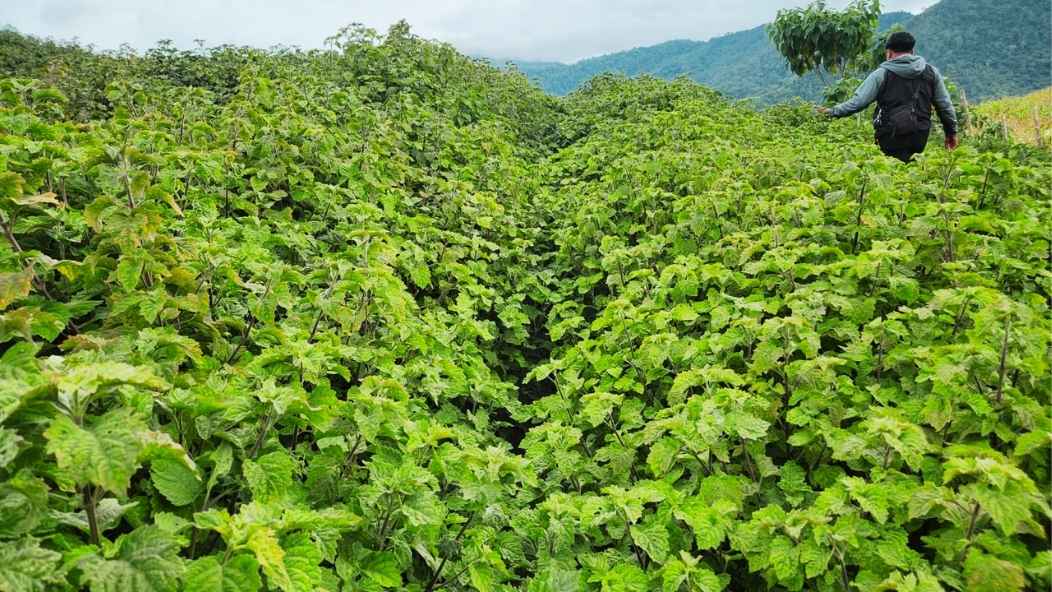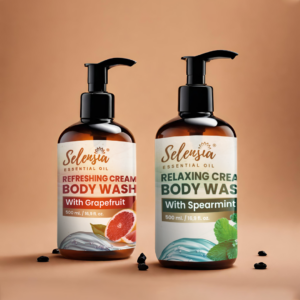The scent of Patchouli has penetrated cultures across the world. This global familiarity can be attributed to its musky, earthy smell that is used in perfumes, essential oils, incense, and even medicines. Regardless of the country of origin, finely cultivated patchouli is available in bulk, whereas smoke patchouli from Indonesia has unique farming practices blended with its tropical climate and fertile soil to make it stand apart from other varieties. In this article, I will explain the distinct characteristics Indonesian patchouli and smoke patchouli have, and the reason why the variety from Indonesia is simply better. In overview, Pogostemon cablin is a herbaceous bush and a member of the mint family that grows in Southeast Asia. It is valued for its oil, which is used for medicinal purposes and fabric scenting. The global patchouli oil market accounts for 72.3 million dollars in 2023 and is expected to grow with Indonesia controlling 80-90% of the world’s patchouli supply.
Indonesian Patchouli: The Origin and Cultivation Process
Indonesia is a leader in patchouli oil production and makes a significant contribution to the global market. The country’s share of patchouli production is exceptionally high due to the favorable agricultural conditions found in various regions. Sumatra, particularly Aceh, North Sumatra, and West Sumatra, is known for producing patchouli oil with a strong aroma, dominating the fragrance industry. Additionally, Java provides fertile land for patchouli production, with variations in the island’s soil and climate adding nuances to the scent. Recently, Sulawesi has made a name for itself as a patchouli oil producer, with its unique soil types enhancing the oil’s profile.
Indonesia’s climate is characterized by high temperatures, humidity, and almost constant rainfall. This climate is ideal for the growth of patchouli plants, which is crucial for producing high-quality oil. The fertile volcanic soil, rich in minerals, helps enhance the aromatic compounds in the patchouli leaves, making Indonesian patchouli oil highly valued. Traditional methods, such as hand-picking the leaves and sun-drying them, have played a key role in improving and maintaining the quality of the oil. Additionally, there is growing interest in eco-friendly farming practices focusing on soil health and biodiversity, ensuring that Indonesia’s patchouli industry remains both environmentally and economically sustainable in the long term.
The Distinct Scent Profile of Indonesian Patchouli
Indonesian patchouli has a distinctive aroma and is highly favored in the fragrance industry for its strong scent, characterized by rich, deep earthy notes with spicy or sweet undertones. While there are many other types of patchouli, Indonesian patchouli is unique because its aromatic evolution is multifaceted, changing over time to reveal layers of warm notes that leave a bold and captivating impression. The high concentration of patchoulol contributes to its distinctive fragrance, known for being intense, strong, and long-lasting. The concentration typically ranges from 30-40%.
In comparison, Indian patchouli has a less pronounced sweetness, with earthy notes that create a slightly camphorous aroma. This variety is simpler compared to its Indonesian counterparts. On the other hand, Chinese patchouli is more herbaceous and has a lighter scent that lacks intensity. This quality is less complex than the abundant richness found in Indonesian patchouli. Malaysian patchouli, while somewhat similar to Indonesian patchouli, is not as intense or long-lasting. Due to its complexity and powerful aroma, Indonesian patchouli is highly sought after.
How Indonesian Patchouli Differs from Other Varieties
Not only does Indonesian patchouli boast a unique aroma, but it also differs from other varieties of patchouli in key aspects like scent profile, longevity, oil quality, and harvesting techniques.
Scent:
The top notes of Indonesian patchouli are brighter and more vibrant than the mustier and earthier top notes of Indian patchouli. While the middle notes tend to be more herbal or green, the Indonesian variety is richer and spicier, adding to the deeper complexity of the aroma. The base notes, which tend to linger longer on the skin compared to the quicker fading notes of other varieties, are deep, woody, and slightly sweet.
Longevity:
Indonesian patchouli oil is known to last for 6-8 hours on the skin, while other varieties, such as Indian and Chinese, tend to last from 3-5 hours. The difference in staying power is due to a higher concentration of aromatic compounds, particularly patchoulol. Additionally, the viscosity of the oil makes it easier for the oil to cling to the skin.
Oil Quality:

Indonesian patchouli oil has high quality recognition. Toward the thicker side, the oil’s viscosity adds to the intensity of its aroma as well as prolongs its effect. It is also noted for its cleanliness, as high-grade Indonesian patchouli oil is known to be free from adulteration claims and has a constant chemical profile. Additionally, compared to other varieties, Indonesian patchouli oil is known to be more superior and distinguished due to its greater patchoulol content, the key fragrance compound.
Harvesting:
With great heritage, the harvesting phase of Indonesian patchouli goes as follows; the leaves are manually gathered, sun-dried, and then steam distilled. This method assures minimal oil alteration in composition or complexity. Other contemporary producers practice mechanised harvesting and modern distillation methods to improve the amount of oil gained, whilst attempting to preserve the quality of the oil. In addition, some producers employ a brief fermentation stage after the oil has been extracted but prior to distillation to increase the complexity and aroma of the oil, further distinguishing Indonesian patchouli from other varieties.
Uses of Indonesian Patchouli vs. Other Patchoulis
Perfumes & Fragrances
Due to its deep, complex, and long-lasting aroma, Indonesian patchouli is a favorite for high-end perfume brands. It is often used in perfumes as a base note – anchoring other fragrances while also adding an earthy and sensual quality to the overall scent. Renowned brands such as Chanel, Dior, and Tom Ford use Indonesian patchouli in their perfumes to leverage its complex and rich profile to add sophistication to the fragrance. Other patchouli varieties, such as Indian or Chinese patchouli, are used in perfumes but lack the same depth and longevity, which are valuable assets in this sector.
Aromatherapy
Patchouli Indonesia sangat dihargai dalam aromaterapi karena kualitasnya yang mendukung, seimbang, dan meningkatkan suasana hati. Kemampuan terapeutiknya menjadikannya populer dalam mengelola stres, kecemasan, dan depresi. Meskipun varietas patchouli lainnya dapat bermanfaat, diyakini bahwa aroma patchouli Indonesia lebih unggul dan oleh karena itu, lebih sesuai untuk mencapai dampak yang langgeng pada pikiran dan tubuh. Karena alasan ini, ia ideal untuk lingkungan yang menenangkan dan merejuvenasi.
Cosmetic Product
As a result of its anti-inflammatory, antiseptic, and skin rejuvenation properties, Indonesian patchouli is well-known in the skincare world. Given its exceptional healing capabilities, it is quite successful in resolving acne, eczema, and dry skin conditions. Ensuring the quality of Indonesian patchouli guarantees that it is not only more effective in these cosmetic formulations but it tends to have a more pleasant and longer lasting scent. Other patchouli types are useful in cosmetics, however, they are less refined in scent and therapeutic benefits compared to Indonesian patchouli.
Sustainability and Ethical Considerations in Indonesian Patchouli Production
Eco-Friendly Practices:
In Indonesia, patchouli farming has progressively integrated environmentally sustainable strategies, diminishing the negative impact on the Earth. These farmers have adopted organic practices that involve the cultivation of patchouli without the use of synthetic herbicides and fertilizers, emphasizing biological pest management alongside crop rotation for soil fertility. Furthermore, farmers are being paid appropriate prices for their crops, which together with other initiatives, provide them with better working conditions. These steps are aiding in creating a more sustainable and just industry for patchouli farmers in Indonesia.
Challenges:
Despite these encouraging developments, there are still issues in the patchouli production. Overexploitation of patchouli may result in soil erosion which can reduce its fertility in the long run and can negatively influence the biodiversity balance of the ecosystem. In some cases, clearing of forests for cultivation of patchouli has led to loss of ecological habitats, adversely impacting the local plant and animal life. In addition, price fluctuation in the global patchouli market may considerably affect the farmer’s economic well-being, especially during off-peak seasons, or when the prices go down.
Sustainable Farming:
To reduce the negative impacts these factors have, a lot of Indonesian farmers who specialize in patchouli crops are now incorporating sustainable practices into their farming methods. Agroforestry is being practiced, where other crops and trees are grown alongside patchouli, which improves biodiversity and lessens the chances of soil depletion. Water harvesting practices and proper waste management are increasingly being adopted to make sure that resources are being utilized efficiently while pollution is minimized. Moreover, certification schemes, such as organic and fair trade are increasingly being sought as they guarantee that production is done in a socially and ecologically responsible manner which is good for the environment and local farmers.
How to Identify Authentic Indonesian Patchouli
Certifications:
In order to make sure that the Indonesian patchouli oil you purchase is indeed genuine, make sure to look for organic, fair trade and origin certifications. Such certifications indicate the quality and source of the oil, and reinforces that it is produced sustainably and ethically. These verifications will be made available from reputable sources, ensuring that the product is authentic and of the highest quality.
Region of Origin:
One of the simplest methods of verifying the authenticity of Indonesian patchouli is through checking the product labels for certain parts of Indonesia. Aceh, Sumatra, and Java are known areas of patchouli oil production, and many good quality oils specifically mention their region. These regions are famous for their distinctly superior growing conditions which result in excellent quality patchouli oil.
Scent Quality:
true authentic indonesian patchouli oil is noted for its rich, deep and multifaceted aroma which is long lasting. While other varieties may have a singular or shorter lived scent, indonesian patchouli stands out since it can be identified by its scent alone. The oil should possess hints of subtley sweet undertones while also being deeply earthy, spicy and woody in nature.
Price Point:
Authentic Indonesian patchouli oil, known to be more expensive than other varieties, is so due to its superior quality and higher production costs. This price point, however, leads to this oil being ‘too good to be true’, if so, it could suggest that the oil is diluted, adultered or worse, sourced from a low quality patchouli variety. Regardless of myths surrounding the high price of Indonesian patchouli oil, it serves as a reflection for the cost of sustainable farming practices and distillation methods.
Product Labeling:
Reputable brands selling authentic Indonesian patchouli will provide clear details on the product label such as its origin, extraction method, and chemical composition of the oil. This transparency not only guarantees the oil’s authenticity but also outlines the effort and attention that went into producing it. Always look for clear labeling and stay away from products with vague or incomplete details.
Why Choose Indonesian Patchouli?
Superior Qualities:
The exceptional qualities within the aroma, longevity, purity, and potency of Indonesian patchouli oil captures the attention from a wide audience. It is treasured for containing deep spicy and woody notes with subtle sweet undercurrents that evolve over time. Scent profiles like these are complex and very captivating. It is lastingly fragrant, often lasting six to eight hours on the skin. Because of this, it is separated from other varieties of patchouli which in turn makes it a desired option for aromatherapy products and high end perfumes. The greater concentration of patchoulol, which is the main component in patchouli oil tends to enhance the potency of the aroma and the oil itself.
Market Reputation:
Indonesian patchouli is known as the gold standard in the perfume industry as well as aromatherapy. Being widely accepted by major brands such as Chanel, Tom Ford, and Dior spoke for their impressive collection of fragrances, this oil was an exception due to its rich, complex scent and its long term benefits. Popular fragrances have added it due to its impressive, base, noticeable and long lasting invention. In aromatherapy, it is celebrated for its grounding effects and mood enhancement which rico mids its reputation as a high quality multifunctional oil.
Testimonials and Expert Opinions:
Indonesian patchouli is well appreciated by perfumers because of its capability to provide fullness, complexity, and warmth to their compositions. It is an ideal base note because it provides support to other more ethereal scents and adds earthy and sensual accords to perfumes. Aromatherapists value it extensively as it possesses the ability to relax and reduce stress while enhancing emotional well-being. Furthermore, users of Indonesian patchouli appreciate its enduring fragrance and skin benefits ranging from anti-inflammation, antisepsis, and rejuvenation making it an ideal skin care and wellness product.
Conclusion
Indonesian patchouli is known to be the best in quality, distinguishing it from the rest of the patchouli varieties. Because the Indonesian patchouli possesses a rich, earthy, and spicy aroma, it is highly sought after in the perfume and aromatherapy business. Among other Indian, Chinese, or Malaysian patchouli, Indonesia surpasses them in complexity and potency. With time, it gives out a multifaceted scent profile. Its deep woody and warm base notes, together with the patchoulol, give it a distinctive and long lasting fragrance ideal for perfumery and even wellness practices.
The reason why this patchouli is set apart is because of the farming done in Indonesia. The unique patches of fertile volcanic soil coupled with the tropical climate makes it an ideal environment for cultivation. After the plants have been harvested, they are sun dried which is sustainable and environmentally friendly. Chanel, Tom Ford and Dior features the Indonesian patchouli in their premium fragrances due to its reputation as the gold standard. Aromatherapists appreciate its therapeutic and grounding features which makes it great for enhancing moods and relieving stress.
Indonesian Patchouli oil is much more than an unforgettable scent. It is also known to have several benefits such as being anti-inflammatory and antiseptic, making it a valuable asset to many skincare and wellness routines.
For those in search of beauty oils or unique fragrances, look no further than Indonesian Patchouli. Its astounding fragrance, quality, and overall benefits make it a must-try for all skincare enthusiasts, aromatherapists, and perfumers. Make sure to try authentic Indonesian patchouli oils and see for yourself why it is considered the gold standard of patchouli. Certified sustainably sourced oils from Aceh, Sumatra, and Java boast unmatched purity and potency, so be sure to seek those out.











